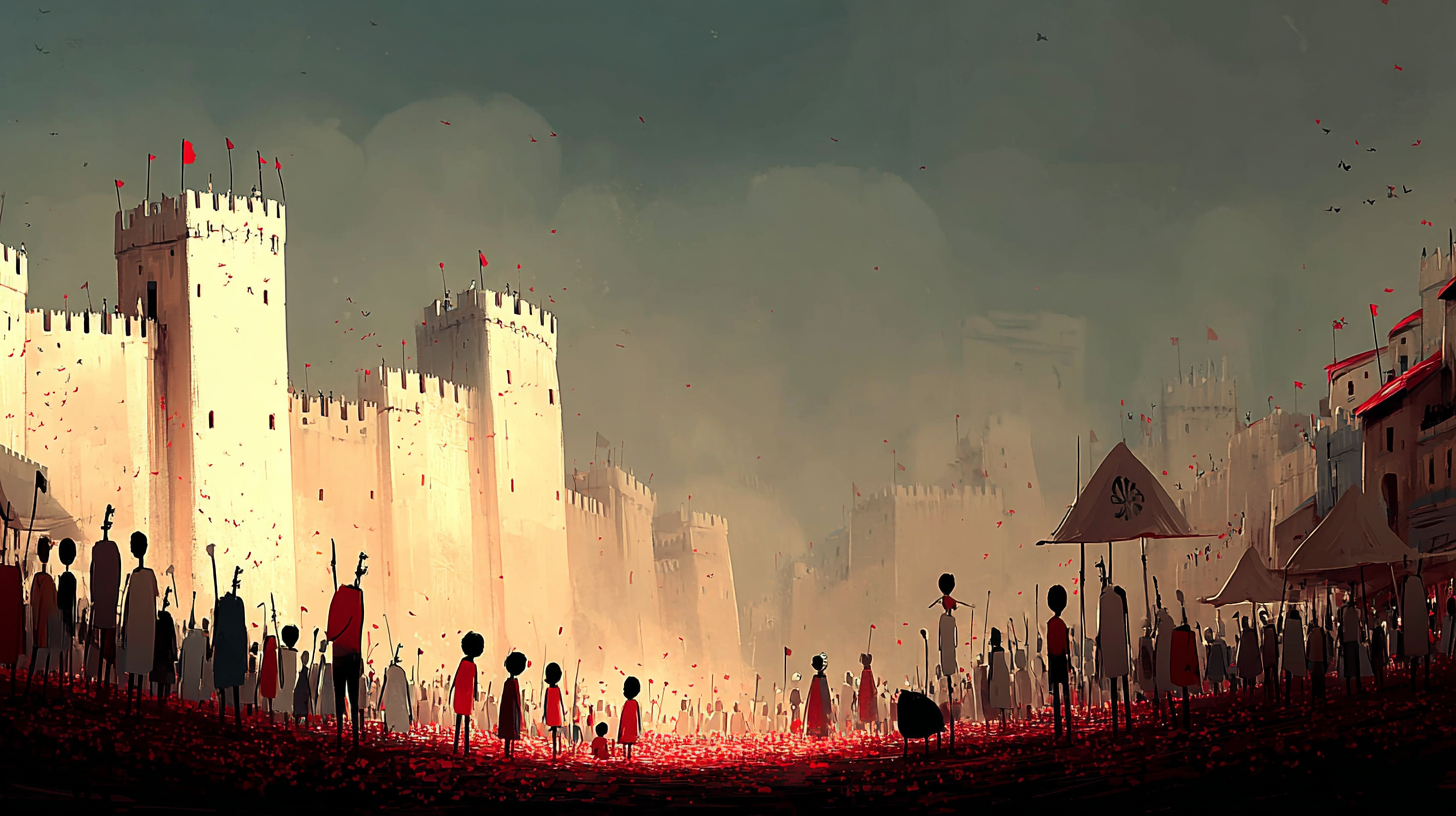“Empire” means a very large country or a very powerful company.
「empire」は、大きな国や力のある会社のこと。
以下は英単語 “empire” に関するストーリー型学習コンテンツです。まずは大枠の意味を理解して最後の文章で確認しましょう。
主な意味(main meaning)
| 品詞 | 発音記号 (IPA) | 意味 | 英語例文 |
|---|---|---|---|
| 名詞 | /ˈem.paɪər/ | 皇帝や王が支配する大きな国や地域(帝国) | The Roman Empire lasted for many centuries. |
| 名詞 | /ˈem.paɪər/ | 大きくて強い組織や会社 | The company built a business empire in the fashion industry. |
語源(etymology)
「empire」はラテン語 imperium(支配、命令)から来ており、「広く強く支配する」というイメージを持つ。
類義語(synonyms)
| 類義語 | 意味 | 英語例文 |
|---|---|---|
| kingdom | 王や女王が支配する国 | The kingdom was famous for its rich culture. |
| realm | 支配する土地や国 | The king ruled over a vast realm. |
| dynasty | 王家が代々続く支配 | The dynasty lasted for more than 300 years. |
| dominion | 支配下の領土 | The islands were under the dominion of the empire. |
反義語(antonyms)
| 反義語 | 意味 | 英語例文 |
|---|---|---|
| colony | 帝国などに支配される国や地域 | The small island was once a colony of Britain. |
| democracy | 民主的に国民が支配する制度 | Democracy gives people the right to vote. |
コロケーション(collocations)
| コロケーション | 英語例文 |
|---|---|
| build an empire | He worked hard to build an empire in real estate. |
| fall of an empire | Historians studied the fall of the empire. |
| vast empire | The emperor ruled over a vast empire. |
| business empire | She controls a large business empire. |
2項表現(binomials)
| 2項表現 | 英語例文 |
|---|---|
| rise and fall | The rise and fall of the empire is well recorded. |
| power and glory | The empire was known for its power and glory. |
英語ストーリー(english story)
English Story
Tom had always been interested in history, especially the stories about the Roman Empire. When he was a child, he read many books about the rise and fall of great kingdoms and realms. His favorite topic was how emperors built a vast empire and how, in the end, every empire faced its decline.
One day, after finishing work at a trading company, Tom visited a café where he often met his colleague, Lisa. Lisa was not only his coworker but also his best friend. She was studying economics and business, and she loved comparing old empires to modern companies.
As they sat down with their coffee, Tom said, “Do you know, Lisa? Our boss is trying to build a kind of business empire. He wants to control every small company in this city.”
Lisa laughed and answered, “Yes, I can see that. But you know what they say: every empire has both power and glory, but also a time of rise and fall. If he doesn’t manage things well, his empire might collapse.”
Tom nodded. “That’s true. It reminds me of the fall of the Roman Empire. It was once the most powerful realm in the world, but it couldn’t last forever.”
Lisa leaned forward. “Exactly. That’s why studying history is so useful. Even in economics, we talk about dynasties of companies. Some business dynasties last for many generations, while others disappear quickly.”
Their conversation grew deeper. Tom thought about the difference between an empire and a colony. He said, “You know, many small colonies wanted freedom, and that’s how new nations were born. Today, many countries are democracies instead of empires.”
Lisa agreed. “Yes, democracy gives people more control. It’s very different from an empire, where one person rules over everything.”
The café became quiet as the evening passed. Tom looked outside and saw the city lights. He imagined that every company, every government, and even every friendship had its own kind of empire—something built with effort and trust, but always facing the challenge of time.
That night, as Tom walked home, he thought about his own life. Maybe one day, he would not build an empire, but he could still build something strong and meaningful.
和訳
トムは昔から歴史に興味があり、特にローマ帝国 (Roman Empire/帝国) の物語が好きだった。子どもの頃、彼は偉大な王国 (kingdom/王国) や領土 (realm/領土) がどのように興隆し衰退していったかを描いた本をよく読んでいた。彼が最も好きだったのは、皇帝がどのように広大な帝国 (vast empire/広い帝国) を築き、最後にはどの帝国も衰退を迎えるという話だった。
ある日、貿易会社での仕事を終えた後、トムは同僚のリサとよく会うカフェを訪れた。リサは同僚であるだけでなく、彼の親友でもあった。彼女は経済学を学んでおり、古代の帝国と現代の企業を比べるのが大好きだった。
二人がコーヒーを飲みながら座ると、トムは言った。
「ねえリサ、知ってる?僕たちの上司は一種のビジネス帝国 (business empire/事業帝国) を築こうとしているんだ。この街の小さな会社を全部支配したいみたいだ。」
リサは笑って答えた。
「ええ、私にもわかるわ。でもよく言うでしょ?どんな帝国にも力と栄光 (power and glory/力と栄光) があるけれど、同時に興亡 (rise and fall/興隆と衰退) もあるって。上手く経営しなければ、彼の帝国は崩れてしまうかもしれないわ。」
トムはうなずいた。
「そうだね。ローマ帝国の崩壊を思い出すよ。かつては世界で最も強力な領土 (realm/領土) だったけど、永遠には続かなかったんだ。」
リサは身を乗り出した。
「その通り。だから歴史を学ぶことはとても役立つの。経済学でも企業の王朝 (dynasty/王朝) について話すわ。ある企業の王朝は何世代も続くけど、他のものはすぐ消えてしまう。」
二人の会話はさらに深まった。トムは帝国 (empire/帝国) と植民地 (colony/植民地) の違いを考えた。
「わかるかい、たくさんの小さな植民地は自由を望んでいた。それが新しい国々の誕生につながったんだ。今日では、多くの国が帝国ではなく民主主義 (democracy/民主主義) なんだ。」
リサは同意した。
「ええ、民主主義は人々にもっと多くの権利を与えるものね。帝国のように一人が全てを支配するのとは全然違うわ。」
夜が更けてカフェは静かになった。トムが外を見ると街の明かりが輝いていた。彼は思った。会社も、政府も、友情でさえ、それぞれに自分の小さな帝国がある。努力と信頼で築かれるけれど、いつも時の試練に直面するのだ。
その夜、トムが家に帰る道で考えたのは、自分自身の人生についてだった。彼は帝国を築くことはないかもしれない。しかし、それでも強く意味のある何かを築くことはできるだろう、と。
Q&A
Q: 「empire」と「kingdom」の違いは?
A: 「empire(帝国)」は、複数の国や民族を一人の皇帝(emperor)が支配する大きな国を指します。一方「kingdom(王国)」は、王(king)や女王(queen)が治める国で、通常は一つの民族や地域に限定されます。
Q: 「empire」と「realm」の違いは?
A: 「realm(領土・王国)」は単に「支配下の土地」という意味で、中立的に国や地域を表せます。対して「empire」は規模の大きさや強力な支配を強調する場合に使います。
Q: 「empire」と「dynasty」の違いは?
A: 「dynasty(王朝)」は、特定の王族や家系が長期間にわたり支配することを表します。「empire」はその支配の規模や勢力を強調し、「dynasty」は支配が血筋で続いていることを強調します。
Q: 「empire」と「dominion」の違いは?
A: 「dominion(支配領)」は、ある帝国や王国の支配下にある地域を表します。「empire」は支配する側全体を指し、「dominion」はその支配下に置かれた土地というイメージです。
Q: 「empire」と「colony」の違いは?
A: 「colony(植民地)」は、大きな国や帝国に支配されている地域のことです。つまり、「empire」が支配する側で、「colony」は支配される側になります。
Q: 「empire」と「democracy」の違いは?
A: 「empire(帝国)」は、一人の皇帝や支配者が強い権力を持つ仕組みです。一方、「democracy(民主主義)」は国民が選挙で権力を決める仕組みで、権力が一人に集中しません。
Q: 「empire」と「business empire」の違いは?
A: 「business empire(ビジネス帝国)」は比喩的表現で、会社や事業がとても大きく成長して、多くの市場や産業を支配する様子を指します。歴史的な「empire」と違い、経済分野で使われる言葉です。
Q: 「empire」と「vast empire」の違いは?
A: 「empire」だけでも大きな国を意味しますが、「vast empire」とすると、その規模が非常に広大であることを強調します。
Q: 「empire」と「fall of an empire」の違いは?
A: 「empire」は存続している強大な国を指します。「fall of an empire」はその国が衰退・滅亡していく過程を意味します。
Q: 「empire」と「rise and fall」の違いは?
A: 「empire」は国家や組織そのものを指します。「rise and fall」はその国や組織の歴史的な流れ(繁栄と衰退)を表す言葉です。
Q: 「empire」と「power and glory」の違いは?
A: 「empire」は国や組織を直接指します。「power and glory」は帝国が持つ力や栄光という性質や評価を表す言葉です。
この違いを押さえると、同じ「大きな国や組織」を表す言葉でも、支配者を強調するのか、規模を強調するのか、支配される側を表すのか、歴史的流れを示すのか が見えてきます。



コメント